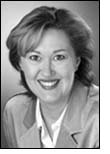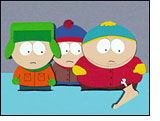God, the recurring character, however, is not always the one we recognize from holy books or worship services. We gathered three experts on religion and the media to discuss where the spiritual TV trend began, how faithful viewers watch, and whether television religion is really religion at all.
 Teresa Blythe is a spiritual director and co-author of two books on religion and pop culture, "Meeting God in Virtual Reality: Using Spiritual Practices with Media" and "Watching What We Watch: Prime-Time Television Through the Lens of Faith."
Teresa Blythe is a spiritual director and co-author of two books on religion and pop culture, "Meeting God in Virtual Reality: Using Spiritual Practices with Media" and "Watching What We Watch: Prime-Time Television Through the Lens of Faith."
 Mark Pinsky is a religion reporter for the Orlando Sentinel. His "The Gospel According to the Simpsons" has sold more than 100,000 copies and spawned a study guide for churches. His new book is "The Gospel According to Disney."
Mark Pinsky is a religion reporter for the Orlando Sentinel. His "The Gospel According to the Simpsons" has sold more than 100,000 copies and spawned a study guide for churches. His new book is "The Gospel According to Disney."
 Jana K. Riess is religion book review editor for Publishers Weekly magazine. Her first book, "What Would Buffy Do? A Vampire Slayer as Spiritual Guide," appeared this Spring.
Jana K. Riess is religion book review editor for Publishers Weekly magazine. Her first book, "What Would Buffy Do? A Vampire Slayer as Spiritual Guide," appeared this Spring.
The moderator for the roundtable, Ellen Leventry, is a former Beliefnet editor who writes frequently about television.
Ellen Leventry: From "The Flying Nun" to "Touched By an Angel," television has always dealt with faith and religion. But "Joan of Arcadia" and recent other-worldly shows are different--the oft-used word is "edgy." When did this new strain of spiritual television begin?
Teresa Blythe: Look at the "spiritual but not religious" Star Wars series, with its Jedi Knights trusting in "the force," or the Matrix trilogy. Television has been using postmodern storytelling since shows like "Homicide: Life on the Streets," which showed multi-faceted police officers contemplating their actions in light of their religious upbringing. And "The X-Files" used religion as a device to reflect on what is alien and mysterious.
But Martha Williamson and her series "Touched by an Angel" really proved that spiritual themes are interesting, relevant and marketable. She made it OK to mention God and act like God exists on TV. If "Touched By An Angel" had not been successful, we would never have seen "Joan of Arcadia," which, by the way, is a much better and more nuanced show. Because Martha had the courage of her convictions, we now watch characters from a variety of faith traditions wrestling with matters of the soul.
My concern, now that spirituality is somehow the "It" topics, is that Hollywood will trivialize or cheapen it. One thing I loved about "Buffy the Vampire Slayer" was
 its refusal to take the easy route. Characters had to struggle with everything, especially spiritual and moral questions. Nothing was taken for granted. It never beat viewers over the head. I'm encouraged, now that "Buffy" and "Angel" are off the air, that other shows have undertaken spiritual questions in fresh ways. "Six Feet Under," particularly, takes a lot of creative risks and strives to make the audience think.
its refusal to take the easy route. Characters had to struggle with everything, especially spiritual and moral questions. Nothing was taken for granted. It never beat viewers over the head. I'm encouraged, now that "Buffy" and "Angel" are off the air, that other shows have undertaken spiritual questions in fresh ways. "Six Feet Under," particularly, takes a lot of creative risks and strives to make the audience think.Mark Pinsky: After "Touched by an Angel" and "7th Heaven" opened the doors opened for other shows, even those not built around a religious premise. My concern is that "the Christian character" may be joining the stock cast along with "the gay character."
Also, notice that while God may be mentioned on television, "Jesus" and "Christ"--except in expletive form--are much more rare. Except on "South Park," of course, where scatology meets eschatology. And why doesn't God tell Joan to go to church?
Teresa: In Mark's latest book, he says Walt Disney didn't put a church on his Main Streets, USA because he wanted people of all religions to feel welcome. Instead of trying to exclude Christians, Disney wanted to be inclusive of everyone else. This relates to why Barbara Hall's characters on "Joan of Arcadia" don't talk about Jesus. At a time when we still hear the United States referred to as a "Christian nation," I applaud both Disney and Hall for being welcoming. The fact that being welcoming is good for business is never lost on me.
Ellen: If "God" is no longer a dirty word on network TV thanks to "Touched By an Angel," which shows made religion and spirituality hip? Was it just a way for the new networks like Fox and UPN to carve out a niche?
Teresa: I think "Charmed" is in that category. It's religion as a pagan, fun-filled freak show. But I don't think the "X-Files" writers were riding the wave of interest in spirituality. They equated religion with the paranormal, in my opinion. But what resulted was a host of progressive Christians--like myself--writing about the theology that we "saw" in the show. We were drawing a whole new meaning from the text--one that the writers probably found amusing.
The point is, once TV is out there exploring the mystical, spiritual, divine part of life, we viewers will make of it what we want. Jana, was the spirituality on "Buffy" intentionally there to draw in viewers?
On the other hand, the series features deeply Christian symbolism--crosses and holy water to repel vampires, and some of the rituals--even vampire rituals--must take place in churches. Moreover, "Buffy" addresses questions that have always interested Christians: Is there a hell? What will it take for me to go to heaven after I die? Can one individual save the world throuugh self-sacrifice? What will the apocalypse look like? And so on.
Buddhism was important on "Buffy" as well. At key moments, as when a character has to make a decision to act compassionately, we see a figure of Kuan-Yin in the background. I don't think it's an accident that the Buddhist saint who exemplifies mercy and compassion appears in the set decoration at those pivotal moments.
Teresa: The producers of these shows seem to have found a way to please everyone and offend very few: just make sure there is a religious symbol or storyline for almost everyone. In the days of Michael Landon's show "Highway to Heaven" in the 1980s, producers and writers ignored religious differences, taking a kind of Unitarian-Universalist stance. Now they dabble in many religions. It allows for more storylines and taps into the postmodern notion that "each religion has a piece of the wisdom," without declaring that any one has all the wisdom. It's also highly marketable, everyone watches to see their worldview pop up.
Mark: I thought I had squeezed every drop of religion from "The Simpsons" when I caught an episode I must have missed earlier this season. Marge tells the story of Henry VIII's split with Rome. I thought it was excellent, but will "The Simpsons" be the extent of what kids know about this historical event? Or will it form a template for everything they learn about it?
Likewise, one of the most interesting episodes of South Park dealt with a Mormon family moving to town. In less than half an hour, the show gave a  history of the denomination that was both knowing and satiric. The conclusion was a knockout-the Mormon kid who was so badly treated lets fly. Yes, our Scriptures may seem wacky to you, he says, and maybe the Book of Mormon wasn't discovered or written by Joseph Smith, but so what? My religion provides me with a stable loving family. Wow! And this from a potty-mouth cartoon!
history of the denomination that was both knowing and satiric. The conclusion was a knockout-the Mormon kid who was so badly treated lets fly. Yes, our Scriptures may seem wacky to you, he says, and maybe the Book of Mormon wasn't discovered or written by Joseph Smith, but so what? My religion provides me with a stable loving family. Wow! And this from a potty-mouth cartoon!
Ellen: So should the spiritual shows be less afraid to be specific like that? Should God tell Joan to go to church?
Mark: I would say there are two routes for "Joan." Either send her to church for an engaging story line: organized religion helps, organized religion fails. Or, have her simply ask God, "Why don't you ever send me to church? It's your house, isn't it?"
Teresa: But Mark, I'm sure you've read Barbara Hall's 10 commandments of Joan. One is that God is not the promoter of any one religion. So is God also going to tell Joan to go to synagogue? Or mosque? Or New Age circle? Or a variety of temples? Or go hug a tree like a happy pagan? If sheo goes to church, which "brand" of Christianity would God tell her to pursue?
Besides, I think Christianity is already privileged on that show. We've seen Joan light a candle in a church. We've seen her mom chat with the local priest. She has also mentioned that she's a lapsed Catholic. The only thing they haven't touched is an explicit mention of Jesus. We can criticize that all we want, but if their goal is to be inclusive they are hitting their mark.
Ellen: More than inclusiveness, aren't the producers of these shows reflecting their own feeling or the public's feeling that true spirituality doesn't happen in church? Isn't that the drift of televised spirituality?
Jana: I think you're on to something. Millions of Americans, myself included, park themselves in a church, synagogue, or mosque every weekend, but there's a clear shift toward non-institutional religion. Sociologists have measured this in numerous ways: the number of people who blend religions or religious practices together, the declining numbers who report that denominationalism is important to them, etcetera.
Whether television writers are reflecting this change or contributing to it is an interesting question. I think it's both. Many people, particularly young people, have written that they appreciated the multi-faith approach in my "Buffy" book. I didn't set out to do that to appeal to a younger audience. I was just commenting on the multiple themes I saw in the show.
Conservatives say it's "watering down" traditional religion. I take a more positive view, that people are more open than in the past. They recognize that they don't corner the market on truth.
Teresa: So true. On television, spirituality is portrayed as helpful while organized religion is either neutral or ineffectual. Churches have contributed to that image. I went to an Easter Sunday service one year that was so stiff and boring that several people under 30, no doubt there as a favor to their parents, were sound asleep. I wished I could have slept through that service. That's when I realized that many churches just don't get it. They don't understand that people are hungering for an experience of God rather than information about God. Churches are critical of the "spiritual but not religious" stance without understanding that it's largely a response to the institutional church.
Churches could learn a few things about how to tell stories, use visual imagery and incorporate music if they would just watch "ER," "24," "Buffy," "Joan of Arcadia" or even "The Daily Show with Jon Stewart." Watch what's popular to see how people respond to words, images and music.
Ellen: Teresa and Mark, both of you have published books suggesting that television can be an important tool in a person's spiritual practice. Can you explain?
Mark: Television can never compete with the impact of a movie on a big screen in a dark theater. Silence is more or less mandatory, at least for drama, but the experience is almost always communal. Television viewing runs the gamut. You watch it alone, on the couch, on the bed, or you can watch it with a group. Communal viewing offers interesting possibilities, since it's considered okay to talk back to the set. This can make the experience instantaneously interactive. When the subject on the screen deals with spirituality, there is potential for some growth-producing discussions.
Teresa: We bring all of who we are into relationship with God. If television is part of our life, and if some of what we see affects us deeply, then bringing that into prayer or daily spiritual reflection is no different than bringing any other aspect of our ordinary life--say a conversation with a friend or an event at work--to prayer. Look at Jesus' use of storytelling to teach. In Jesus' stories, images from the agrarian-culture of the day were used to help listeners make connections. If Jesus were walking around the culture today, would he not use the elements of our information-based culture to make his points?
I also tie all discussions of media messages to discussions of spiritual discernment. Thousands of media messages come at us daily. Which ones do we pay attention to? We sift through them and hold onto what is good, true and beautiful. That's the heart of spiritual discernment. We have the power to accept or reject the messages we receive. I urge people to use their power!
Actually, the younger the person the less this type of question or concern comes up. People raised in the digital age make fewer distinctions between what is sacred and what is secular. Yet I am not dismissive of the concerns. Again, it comes back to my main admonition: Be Discerning.

